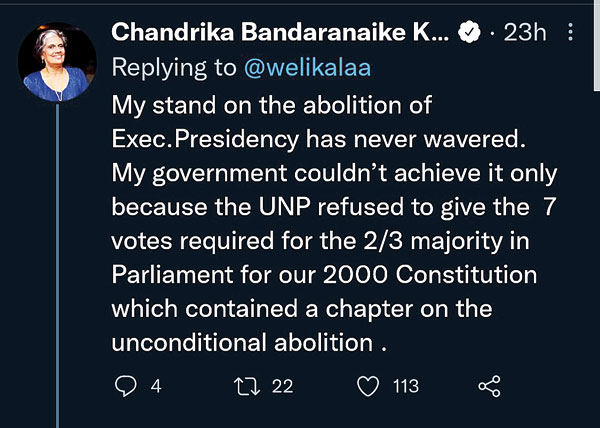Columns
China sugarcoats debt requests but highlights interference by UNHRC
View(s):With An IMF delegation in Colombo, the much-discussed topic in diplomatic circles this week was China’s response to Sri Lanka’s repeated requests for the restructuring of bilateral loans since it makes up more than 40% of the total Government to Government (GtoG) debt the country owes. 
The Chinese downplayed the critical requests from the Sri Lankan side, except for sugarcoated diplomatic words such as “extending support to the Sri Lankan government to relieve it from the economic crisis” but nothing more substantial so far, a diplomat lamented.
Meanwhile, in a detailed Op-Ed by Chinese Ambassador Qi Zhenhong, disseminated from the Chinese embassy in Colombo, the Chinese focus turned on something different but timely. It was the 51st session of the United Nations Human Rights Council in Geneva where human rights issues in Sri Lanka might probably be stirred up again.
“As the Sri Lankan people are still grappling with severe economic and humanitarian difficulties, many might wonder what those countries who have been always preaching about human rights will actually do. Will they help Sri Lanka to ease its human rights crisis by providing concrete support? Or will they again use human rights as a cover-up tool to interfere into the island nation’s internal affairs and continue to rub salt into the wound of Sri Lankan people? Just let’s wait and see,” Ambassador Zhenhong said.
CBK: Did the curse become a blessing for her?
Since President Ranil Wickremesinghe took office, there has been little focus on the longstanding call to abolish the Executive Presidency. Almost every President who occupied the powerful seat vowed to do so before their election, but the promise was gone with the wind once they secured it.
This week, academic Dr Asanga Welikala, recalled on Twitter why the Executive Presidency has to be abolished and the need to “reorient our entire order of constitutional governance to the common good, that is, to the principles of peace, prosperity, just authority, sustainability, solidarity, and subsidiarity.”
Former President Chandrika Kumaratunga also joined in to say her stand on the issue has not wavered. Before her election she described the Executive Presidency as “a curse” and promised to abolish it within 24 hours.
“My government could not abolish the Executive Presidency because the United National Party (UNP) refused to give the seven votes required for the 2/3 majority in Parliament for our 2000 Constitution which contained a chapter on the unconditional abolition,” she wrote in the micro blog.
She also claimed she had given up many privileges including returning several vehicles assigned to her as a former Head of the State.
“I donate the entirety of my pension to charity and recently called for the reduction of privileges to incumbent and former VIPs.”
Alas, she seems to have selective memory loss nowadays. On July 14, 1995 the date announced by her then Constitutional Affairs Minister G.L. Peiris to abolish the Executive Presidency, her Presidential Security Division thrashed the daylights out of those asking for her promise to be kept. They were tear-gassed and baton charged and sent to hospital, and she went on to be Executive President for ten more years and was deprived of an additional year only by the Supreme Court.
Cutting fx costs– Mission impossible
Like every state institution that is laser-focused on cost-cutting strategies these days, the Foreign Ministry is no exception since a significant amount of tax payers’ money is utilised to run Sri Lankan missions across the globe despite the worst economic crisis the country is undergoing.
In the recent past, the Ministry came under severe criticism for lavish spending by some selected missions located in influential Western countries and the conduct of politically linked individuals including children of politicians who were appointed as officials in those missions at the expense of taxpayers’ money. 

A recent internal audit carried out by the Ministry on expenditure by 67 Sri Lankan missions abroad revealed the Ministry spent US$ 18 million (Rs 4.7 billion) from January to June this year.
Sri Lankan missions at the United Nations both in New York and Geneva cost nearly US$ one million each while embassies in the United States, Saudi Arabia and Italy were among the top five high expenditure destinations for the Ministry. A Ministry official said, based on the report they were looking at how they could further reduce the costs as the country was struggling to secure adequate forex for essential imports.
Earlier, the Sunday Times Right to Information (RTI) desk filed multiple requests seeking expenditure and staff details on Sri Lankan missions abroad but the information was yet to be provided even after following up with relevant officers.
Top State officials indirectly steal valuable gadgets
This week the import ban on selected items was further extended up to some 400 items that include laptops and digital gadgets. Soon after this, the Presidential Secretariat came up with a list of individuals who were personally assigned with items for official use but were yet to hand them over to their respective departments.
The list of some thirty officers including former principal advisors to the President, senior administrative officials and security personnel who were given items such as mobile phones, laptops, Ipads, Iphones and other digital gadgets for official use but failed to return them to the respective departments after they vacated their offices or were transferred to other departments.
The Presidential Secretariat said it was planning to take legal action by lodging a complaint at the Colombo Fort Police about the missing items if those officials failed to return them within a grace period as they belong to the State.
According to a Presidential Secretariat official this has become a major issue for the new teams which had been appointed under the new administration to carry out their tasks since there were no funds available to import new items.
Lankan Ambassador invites tourists for a serendipitous experience
One of the key tasks assigned to Sri Lankan High Commissioners and Ambassadors is to promote tourism in their host countries. This is expected to bring in more tourists and with them much needed US dollars.
In China, Sri Lanka’s Ambassador Dr Palitha Kohona seemed active when it comes to taking part in such tourism-related promotional activities since Chinese tourists make up a huge margin of the country’s tourist arrivals.
Addressing the Asian Mountain Tourism Alliance held last week, he said while Sri Lanka lacked snow-covered peaks, it possessed perhaps the only high peak in the world sacred to three of the world’s key religions; Sri Pada to Buddhists and Adam’s Peak to Christians and Muslims.
“Thousands climb the mountain to express their religious fervour and to experience the incomparable sense of freedom and serenity,” said a statement issued by the Foreign Ministry.
Ambassador Kohona went one step further to woo Chinese tourists back home with their own taste. Noting that the Greeks called the island “Serendip” which gave rise to the English word serendipity–a pleasant surprise around every corner–he stressed in Chinese it is called Yuan Feng. Dr Kohona invited the audience at the event for a ‘yuanfeng’ experience in Sri Lanka.
Three-member committee appointed to look into Tamil Diaspora’s concerns
By Chris Kamalendran
Justice and Prison Affairs Minister Wijeyadasa Rajapakshe has appointed a three-member committee headed by former Chief Justice Asoka de Silva to look into issues raised by the Tamil Diaspora representatives.
This is after he initiated a first meeting with Tamil Diaspora members through a teleconference.
The minister held a lengthy teleconference last Sunday with Canadians for Justice and Equality–a Canada based Diaspora organisation–and Diaspora representatives in four other countries including Australia and France. The Canadian organisation was led by Roy Samathanam who was also detained under the Prevention of Terrorism Act (PTA) for a lengthy period before being acquitted and released.
The Tamil Diaspora community had laid down two main conditions to continue discussions; the early release of political prisoners and putting a stop to the harassment of civilians in the North and East. They also told the minister they want the state to strengthen reconciliation among the communities.
Minister Rajapakshe confirmed to the Sunday Times that he had initiated the meeting with the Diaspora community and had “listened carefully” to their concerns. A three-member committee was appointed thereafter, and he met with the committee members on Friday.
“We should not leave this issue for the next generation to resolve. We must strive to ease these grievances as early as possible and build up the country,” he said.
Diaspora representatives had also raised the matter of forcible land acquisition in the North and East by security forces.
“We are in the process of releasing lands to their rightful owners. This is an ongoing exercise,” the minister said.
At the moment, 20 Tamil prisoners are convicted under the Prevention of Terrorism Act (PTA) and 22 prisoners have cases pending against them, the minister said. He said the Government was preparing to amend the Criminal Procedure Code to ease overcrowding in prisons.
Buying or selling electronics has never been easier with the help of Hitad.lk! We, at Hitad.lk, hear your needs and endeavour to provide you with the perfect listings of electronics; because we have listings for nearly anything! Search for your favourite electronic items for sale on Hitad.lk today!


Leave a Reply
Post Comment